|
|
|
Sort Order |
|
|
|
Items / Page
|
|
|
|
|
|
|
| Srl | Item |
| 1 |
ID:
134082
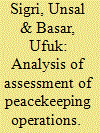

|
|
|
|
|
| Publication |
2014.
|
| Summary/Abstract |
This article proposes a model for assessment of peacekeeping operations. Peacekeeping operations began in 1948, under the authority of the United Nations in order to provide and sustain a peaceful environment throughout the world. International organizations such as the United Nations, the North Atlantic Treaty Organization and the African Union undertake peacekeeping operations in different geographical regions of the world. However, they lack some aspects of the assessment process. There were studies conducted previously in order to determine the principles of the assessment process of peacekeeping operations but none of them presented a comprehensive solution. Therefore, in this study, a clear, comprehensive and detailed assessment model was proposed, which may be applied in future peace operations and shed more light on the subject for future researches.
|
|
|
|
|
|
|
|
|
|
|
|
|
|
|
|
| 2 |
ID:
124414


|
|
|
|
|
| Publication |
2013.
|
| Summary/Abstract |
This article analyzes the Government of Canada's decision to lobby the North Atlantic Treaty Organization (NATO) to lead the International Security Assistance Force (ISAF) in Afghanistan in 2003. Although studies have been conducted on Canada's choice to deploy to Kandahar province, the decision to lobby NATO, and the diplomatic efforts that resulted, have been given little attention. In addition, Ottawa's decision to propose joint leadership of the mission with Germany in 2003 warrants further study. This article considers three key motivations evident in the Canadian government's thinking-first, its view of deployment to Afghanistan as an alternative to deployment to Iraq; second, its interest in developing relations with Germany; and finally, its more general motivation to return to the conflict.
|
|
|
|
|
|
|
|
|
|
|
|
|
|
|
|
| 3 |
ID:
124876
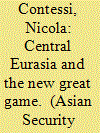

|
|
|
|
|
| Publication |
2013.
|
| Summary/Abstract |
In the 20 years since independence from the former Soviet Union, the study of Eurasia in International Relations (IR) has received considerable impetus in both the academic and policy circles. Specialized news and analysis outlets have come online, research centers have multiplied within universities, and a variety of think tanks now host dedicated programs. In other words, this still relatively little-known region has glamour. Yet Eurasia remains difficult to situate as an object of study due to its distinctive hybridity: geographical, at the crossroads between Europe and Asia; cultural, Muslim Russianspeaking Turkic peoples with Asian traits and traditions; political, straddling Western and Asian institutional forms domestically, and contiguous to Europe, Asia, Russia, the Middle East, and Afghanistan internationally. Partly as a result of this hybridity, Eurasia is a somewhat elusive object of study. At a minimum, it comprises the two subregions on each shore of the Caspian basin: Central Asia to the east and the Caucasus to the west. Reflecting this elusiveness, Central Asian states (CAS) belong to the Asia-Pacific Regional Group at the United Nations; they are members of the Asian Development Bank and the Economic Commission for the Asia-Paci?c. At the same time, they are members of the Organization for Security and Cooperation in Europe (OSCE), the European Bank for Reconstruction and Development, and the Euro-Atlantic Partnership Council, a North Atlantic Treaty Organization (NATO) ancillary forum. But they also have distinctly Central Asian groupings, such as the Eurasian Development Bank, the UN-af?liated Central Asian Regional Information and Coordination Center, not to mention the Shanghai Cooperation Organization (SCO) and Collective Security Treaty Organization (CSTO). Similarly, the three Caucasian states share most of the same af?liations, except for belonging to the East European Regional Group at the UN
|
|
|
|
|
|
|
|
|
|
|
|
|
|
|
|
| 4 |
ID:
033967


|
|
|
|
|
| Publication |
London, times Books Limited, 1984.
|
| Description |
xiii, 208p.
|
| Standard Number |
0723002649
|
|
|
|
|
|
|
|
|
|
|
|
Copies: C:1/I:0,R:0,Q:0
Circulation
| Accession# | Call# | Current Location | Status | Policy | Location |
| 025261 | 327.116/GOD 025261 | Main | On Shelf | General | |
|
|
|
|
| 5 |
ID:
129134
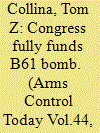

|
|
|
|
|
| Publication |
2014.
|
| Summary/Abstract |
Striking a compromise on a controversial issue, Congress in January passed legislation to provide $537 million, the full amount the Obama administration had requested, for the program to rebuild the B61 nuclear gravity bomb and require the administration to submit detailed reports on alternatives to this plan. Congress also mandated the eventual retirement of a different gravity bomb, the B83, once the B61 is ready for service. These items were part of an omnibus appropriations bill signed by President Barack Obama on Jan. 17. The new law is a $1.1 trillion conglomeration of 12 appropriations bills that had to be passed to keep the government open for the remainder of the fiscal year, which ends Sept. 30. The legislation includes $7.8 billion for nuclear weapons activities conducted by the Energy Department's semiautonomous National Nuclear Security Administration (NNSA). One of the key nuclear policy questions left unresolved last year was how much money the NNSA would be allowed to spend to extend the service life of about 400 B61 gravity bombs. About half of the B61s are stored in European NATO countries for use on tactical, or short-range, aircraft; the rest are stored in the United States for use on strategic, or long-range, bombers.
|
|
|
|
|
|
|
|
|
|
|
|
|
|
|
|
| 6 |
ID:
037495


|
|
|
|
|
| Publication |
London, Brassey's Defence Publishers, 1988.
|
| Description |
xii, 156p.
|
| Series |
Common security studies;1
|
| Standard Number |
008032534
|
|
|
|
|
|
|
|
|
|
|
|
Copies: C:1/I:0,R:0,Q:0
Circulation
| Accession# | Call# | Current Location | Status | Policy | Location |
| 029659 | 327.116094/WIN 029659 | Main | On Shelf | General | |
|
|
|
|
| 7 |
ID:
037755


|
|
|
|
|
| Publication |
Washington, National Defence University Press, 1987.
|
| Description |
ix, 178p.
|
|
|
|
|
|
|
|
|
|
|
|
Copies: C:1/I:0,R:0,Q:0
Circulation
| Accession# | Call# | Current Location | Status | Policy | Location |
| 027987 | 327.116091821/SCH 027987 | Main | On Shelf | General | |
|
|
|
|
| 8 |
ID:
130686
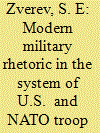

|
|
|
|
|
| Publication |
2014.
|
| Summary/Abstract |
The article examine modern western military rhetoric and ways in which it can be used in training and educating the US and NATO servicemen. Its looks into the evolution of views on the place of effective communication in the US army and the process of forming communication competence in US military education control documents.
|
|
|
|
|
|
|
|
|
|
|
|
|
|
|
|
| 9 |
ID:
131055
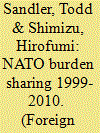

|
|
|
|
|
| Publication |
2014.
|
| Summary/Abstract |
Motivated by US Secretary of Defense Robert Gates' farewell address to NATO, this article investigates whether NATO burden-sharing behavior has changed during the last ten years. Based on a Spearman rank correlation test, we find almost no evidence that the rich NATO allies shouldered the defense-spending burden of the poor allies during 1999-2009. In 2010, there is the first evidence of the exploitation of the rich. When allies' defense burdens are related to defense benefit proxies, a Wilcoxon test finds that there is no concordance between burdens and benefits after 2002. This is indicative of a less cohesive alliance, in which allies are not underwriting their derived benefits. We also find that allies' benefits, which are tied to their exposed border protection and terrorism risk, motivate defense spending. Allies' benefits, based on economic base and population, are less of a driver of defense spending for most NATO allies. We devise a broad-based security expenditure burden that accounts for defense spending, UN peacekeeping, and overseas foreign assistance. In terms of this security burden, there is evidence of the exploitation of the rich by the poor beginning in 2004. Our findings indicate a two-tiered alliance that faces significant policy challenges.
|
|
|
|
|
|
|
|
|
|
|
|
|
|
|
|
| 10 |
ID:
131189
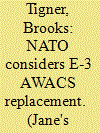

|
|
|
|
|
| Publication |
2014.
|
| Summary/Abstract |
NATO must decide this year on whether and how to replace its against fleet of Boeing E-3 sentry airborne warning and control system (AWACS) aircraft, allied officials have told HIS Jane's.
|
|
|
|
|
|
|
|
|
|
|
|
|
|
|
|
| 11 |
ID:
132510
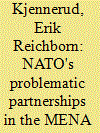

|
|
|
|
|
| Publication |
2014.
|
| Summary/Abstract |
This essay analyzes how the North Atlantic Treaty Organization (NATO) is likely to address the new security environment in the Middle East and North Africa (MENA) region. It investigates how factors internal and external to the alliance shape the possibilities and limits for its ambition to strengthen and develop its regional partnerships in order to enhance security and stability there. NATO's ambitions are likely to be hampered by competing priorities within the alliance, as the as the members are increasingly facing diverging interests and financial austerity as well as domestic political change and regional rivalries in the MENA region.
|
|
|
|
|
|
|
|
|
|
|
|
|
|
|
|
| 12 |
ID:
131190
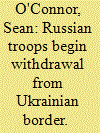

|
|
|
|
|
| Publication |
2014.
|
| Summary/Abstract |
Russian forces close to Ukraine's border appear to be drawing down or relocating, HIS Jane's satellite imagery analysis indicates
|
|
|
|
|
|
|
|
|
|
|
|
|
|
|
|
| 13 |
ID:
037250


|
|
|
|
|
| Publication |
Kent, Croom Helm, 1986.
|
| Description |
xiv, 334p.
|
| Standard Number |
070991086x
|
|
|
|
|
|
|
|
|
|
|
|
Copies: C:1/I:0,R:0,Q:0
Circulation
| Accession# | Call# | Current Location | Status | Policy | Location |
| 026815 | 327.116/FLA 026815 | Main | On Shelf | General | |
|
|
|
|
| 14 |
ID:
133380


|
|
|
|
|
| Publication |
2013.
|
| Summary/Abstract |
As North Atlantic Treaty Organization heads of state and government gathered in Chicago for the 2012 NATO summit, the alliance was once again faced with an abundance of issues and challenges. Initially forecasted as a brief, in-progress review of the decisions taken at the 2010 Lisbon, Portugal, gathering, the Chicago summit quickly emerged as an important crossroads moment for the sixty-three-year-old alliance. The future of the alliance's forces in Afghanistan, continued support to Libya, cyberdefense, and missile defense were but a few of the pressing issues that found their way into an ambitious agenda and the summit's final declaration. Nevertheless, it was the formal unveiling of the alliance's collective response to years of declining defense budgets and accelerating defense austerity that would quietly take center stage. …
|
|
|
|
|
|
|
|
|
|
|
|
|
|
|
|
| 15 |
ID:
129131
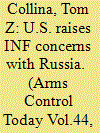

|
|
|
|
|
| Publication |
2014.
|
| Summary/Abstract |
The U.S. State Department confirmed in January that Russia may have breached a landmark arms control agreement by testing a new cruise missile, but has not concluded that Russia violated the accord.
Confirming the details of a Jan. 29 report in The New York Times, State Department spokeswoman Jen Psaki said at a Jan. 30 press briefing that the United States has raised the "possibility of…a violation" with Russia and U.S. NATO allies. The specific U.S. allegation is that Moscow flight-tested a new medium-range, land-based cruise missile. Such a test would run afoul of the 1987 Intermediate-Range Nuclear Forces (INF) Treaty, which permanently bans ground-launched ballistic or cruise missiles capable of traveling 500 to 5,500 kilometers. Rose Gottemoeller, acting undersecretary of state for arms control and international security, has discussed the issue with her Russian and NATO counterparts, Psaki said, adding that "there's still an ongoing review, an interagency review, determining if there was a violation." Psaki indicated that the administration does not view the INF Treaty as being in serious jeopardy.
|
|
|
|
|
|
|
|
|
|
|
|
|
|
|
|
|
|
|
|
|